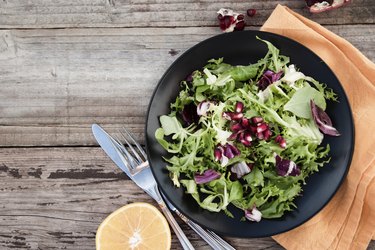
Folic acid, also known as folate, is a B vitamin. Too little of the vitamin has been linked to a wide range of health issues, including cancer, heart disease, neurological and neuropsychological disorders, preterm birth and stroke. It's particularly important for pregnant women to get enough folate as this vitamin can prevent birth defects. The National Institute of Health lists 400 micrograms of dietary folate as the appropriate amount for most people. Pregnant women should take 600 micrograms per day. Folate naturally occurs in fruits, vegetables and beans, and is called vitamin B9 in supplement form. According to the U.S. National Library of Medicine, the terms folate and folic acid can be used interchangeably.
Fruits and Vegetables with Folate
Video of the Day
Fruits and vegetables are excellent sources of naturally occurring folic acid. According to the United States Department of Agriculture, folic acid and folate-rich fruits and vegetables include:
Video of the Day
- Avocado: Half a cup of avocado has 59 micrograms of folate.
- Banana: One medium-sized banana has 24 micrograms of folate.
- Cantaloupe: Half a cup of cantaloupe has 17 micrograms of folate.
- Citrus fruits: Many citrus fruits, including oranges, grapefruits and lemons, are rich in folate. One small orange has 29 micrograms of folate, while 3/4 cup of orange juice has 35 micrograms.
- Papaya: Half a cup of papaya has 27 micrograms of folate.
Examples of some vegetables with folic acid include:
- Asparagus: Just four spears of asparagus contain 89 micrograms of folate.
- Broccoli: Half a cup of cooked broccoli has 52 micrograms of folate.
- Brussels sprouts: Half a cup of boiled Brussels sprouts has 78 micrograms of folate.
- Dark, leafy green vegetables including mustard greens, collard greens and spinach: Half a cup of boiled spinach can have as much as 131 micrograms of folate, while a whole cup of raw spinach has 58 micrograms. Other leafy greens, like mustard greens and collard greens, contain about 30 to 50 micrograms of folate per half cup.
- Lettuce: One cup of lettuce has 64 micrograms of folate.
Read More: How Much Folic Acid Can You Take a Day?
Other Sources of Folic Acid
Because folic acid is technically the supplement version of folate, you're most likely to find it in supplemented and fortified foods. Folic acid is not considered as beneficial as naturally-occurring dietary folate. Fortified and supplemented folic acid foods only count as 0.6 micrograms compared to every naturally-occurring microgram of dietary folate. However, folic acid foods are easily obtainable. The U.S. Food and Drug Administration has been adding folic acid to many cereal and grain products since 1998. This means that even refined rice, pasta, bread products and breakfast cereals can be good sources of folic acid.
The Importance of Folic Acid
Folic acid is well-known for its importance in fetal development. It decreases various risks, including low birth weight, developmental learning issues and preterm delivery. A 2018 study in the Journal of the American Medical Association: Neurology showed that folic acid may reduce the risk of autism in children exposed to antiepileptic drugs during gestation.
Read More: Signs & Symptoms of Folic Acid Deficiency
In men and non-pregnant women, folic acid also helps prevent anemia, diarrhea and ulcers. Folic acid is known to work well with vitamin B-12, vitamin C and iron, so supplementation of these vitamins and minerals may be advised at the same time. It is particularly important to consume vitamin B-12 foods and iron-rich foods when anemias are an issue as folic acid supplements can sometimes mask vitamin B-12 deficiency.
Folic acid is water-soluble, which means that it leaves the body when you urinate. Since this vitamin isn't stored in the body, it's important to eat folic acid foods each day. However, be sure not to take too many supplements. While folate is generally considered non-toxic, excessive consumption of supplemental folic acid may be harmful.
- Schizophrenia Bulletin: T44. A RANDOMISED, DOUBLE-BLIND, PLACEBO-CONTROLLED TRIAL OF THE EFFECTS OF VITAMIN B12, B6 AND FOLIC ACID ON COGNITION AND SYMPTOMS IN FIRST-EPISODE PSYCHOSIS: THE VITAMINS IN PSYCHOSIS STUDY
- Medicine: Folic acid supplementation during the preconception period: A systematic review and meta-analysis
- JAMA Neurology: Association of Folic Acid Supplementation During Pregnancy With the Risk of Autistic Traits in Children Exposed to Antiepileptic Drugs In Utero
- JAMA Psychiatry: Neuroprotective Effects of Prenatal Folic Acid Supplementation Why Timing Matters
- Science Direct: Iron, vitamin B12 and folate
- Nature: European Journal of Clinical Nutrition: The adverse effects of an excessive folic acid intake
- NCBI: Guideline: Daily Iron and Folic Acid Supplementation in Pregnant Women.
- Harvard T.H. Chan School of Public Health: Three of the B Vitamins: Folate, Vitamin B6, and Vitamin B12
- National Institute of Health: Folate
- USDA Food Composition Database: Folate and Folic Acid
- U.S. National Library of Medicine: Medline Plus: Folic acid in diet
- American Journal of Clinical Nutrition: Folic acid fortification: is masking of vitamin B-12 deficiency what we should really worry about?
- American Journal of Clinical Nutrition: Folic acid: influence on the outcome of pregnancy